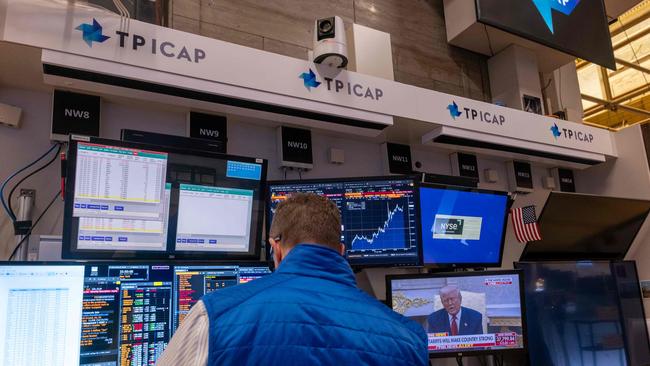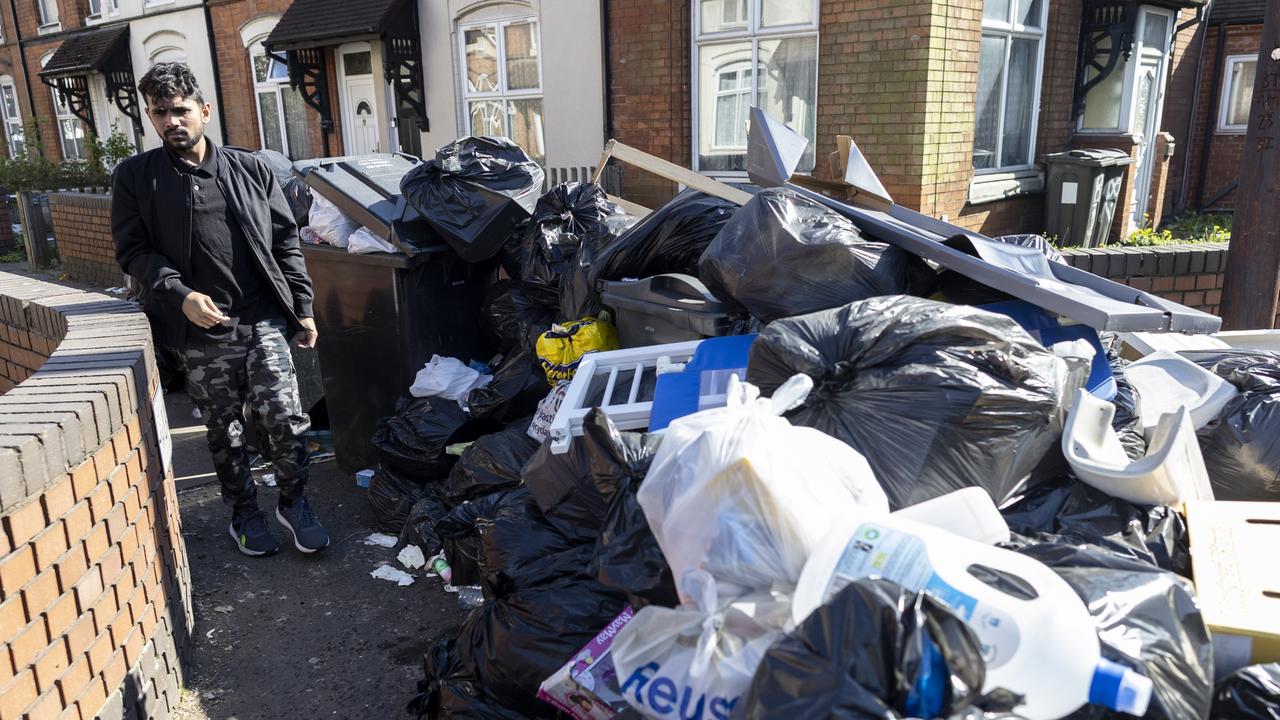US stocks fall as Trump turns screws on China, which will ‘fight to the end’
Wall Street’s fresh falls triggered history lessons as hopes faded on Trump’s tariff negotiations. As it stands, 104 per cent tariffs on China will go into effect at midnight US time.

A big bounce-back rally has stalled on Wall Street, with volatility picking up in the afternoon and a broad retreat from intraday highs short-circuiting a brief celebration of increased trade clarity.
The Dow industrials rose 1461 points early on, reflecting investor faith that the administration may deliver on talk of potential trade deals. They closed down 0.8 per cent, or 320 points, and at a 52-week low. The S&P 500 fell 1.6 per cent, and the Nasdaq Composite dropped 2.2 per cent, after each had rallied more than 4 per cent earlier.
The S&P 500 had a historic day; its swing marked the first time since at least 1978 that the benchmark hit an intraday high up more than 4 per cent only to close down more than 1 per cent. The tech-heavy Nasdaq blew its biggest intraday gain since at least 1982.
“I don’t think we’ve seen the bottoms yet,” said Donald Calcagni, chief investment officer at Mercer Advisors. “We are still early innings on this whole tariff issue, and it’s going to take some time to play out.”
The enthusiasm started when Treasury Secretary Scott Bessent said the Trump administration was open to negotiating to reduce tariffs, saying the US could “end up with some good deals.”
US President Donald Trump said he spoke with South Korea’s president and that the administration was in discussions with “many” nations.
The ecstatic tone didn’t last the morning, though. US Trade Representative Jamieson Greer said Trump won’t provide exemptions to his new global tariffs for individual products or companies. Stocks declined from their highs at midmorning.
Stocks extended their pullback from earlier highs Tuesday afternoon with a fresh sell-off in the tech favourites that led the market advance the past two years.
Apple fell 5 per cent.
Markets gyrated wildly Monday, driven in part by hopes for tariff resolution that turned out to be unfounded, before ultimately settling largely unchanged.
The administration also signalled it was open to discussing lower tariffs with Japan, Israel and some other countries. Japanese stocks jumped after Bessent said the country would be prioritised in trade talks.
Meantime, Beijing lashed back at Trump’s threat of even higher tariffs on China, raising the spectre of an all-out trade war between the world’s two biggest economies. “If the US insists on its own way, China will fight to the end,” the country’s Commerce Ministry said.
Trump said he will slap an extra 50 per cent tariff on China if Beijing didn’t drop plans to retaliate against extra levies he announced last week.
The US president insisted that the ball was in China’s court because Beijing “wants to make a deal, badly, but they don’t know how to get it started.” “We are waiting for their call. It will happen!” he wrote on social media Tuesday.
In a sign Beijing is digging in for a protracted battle, the government threw its weight behind the stock market and devalued the yuan against the dollar, pulling a reference rate below a key threshold for the first time since the fall of 2023.
China ‘confident’
In the war of words, China also condemned remarks by Vice President JD Vance in which he said the United States had for too long borrowed money from “Chinese peasants.”
The European Union sought to cool tensions, with the bloc’s chief Ursula von der Leyen warning against worsening the trade conflict in a call with Chinese Premier Li Qiang.
She stressed stability for the world’s economy as well as “the need to avoid further escalation,” according to a readout from EU officials.
The Chinese premier told Ms von der Leyen that the world’s number two economy could weather the economic storm.
“China can fully hedge against adverse external effects, and is fully confident of maintaining sustained and healthy economic development,” he said.
The EU – which Trump has criticised bitterly over its tariff regime – may unveil its response next week to the 20 per cent levies it is facing under Mr Trump.
French President Emmanuel Macron called on the defiant US president to reconsider, adding if the EU was forced to respond “so be it.” “France and Europe never wanted chaos,” he said.
In retaliation for levies introduced in mid-March on steel and aluminium, the EU plans tariffs of up to 25 per cent on US goods ranging from soybeans to motorcycles and make-up, according to a document seen by AFP.
Deals to be cut
Earlier, White House adviser Kevin Hassett told Fox News that the administration would prioritise allies like Japan and Korea among the dozens of nations wanting to cut deals.
Mr Bessent also said the Trump administration was open to negotiating deals to reduce tariffs.
Mr Bessent told CNBC that Japan was at the forefront of talks so far, while asserting that China had made a “big mistake” in announcing retaliatory levies on US goods.
“I think you’re going to see some very large countries with large trade deficits come forward very quickly,” he added. “If they come to the table with solid proposals, I think we can end up with some good deals.”
Wall Street stocks rose Tuesday, as Mr Trump reported a “great call” with South Korea’s leader.
Europe’s main indices finished with gains of more than two per cent, while Asia’s leading indices also rose after suffering heavy falls Monday.
“Investors took advantage of lower valuations and grew more optimistic about US tariff negotiations,” said IG analyst Axel Rudolph.
Mr Trump believes the tariffs will revive America’s lost manufacturing base by forcing foreign companies to relocate to the United States, rather than making goods abroad.
But many business experts and economists question that, and say his tariffs are arbitrary.
The US president has ruled out any pause in his aggressive stance, despite retaliatory action from China and signs of criticism from within his Republican Party.
Mr Trump’s trade representative Jamieson Greer told the Senate that: “Nearly 50 countries have approached me personally to discuss the president’s new policy and explore how to achieve reciprocity”.
Several countries – including Argentina, Vietnam and Israel – had offered to reduce their tariffs, he said.
With AFP






To join the conversation, please log in. Don't have an account? Register
Join the conversation, you are commenting as Logout